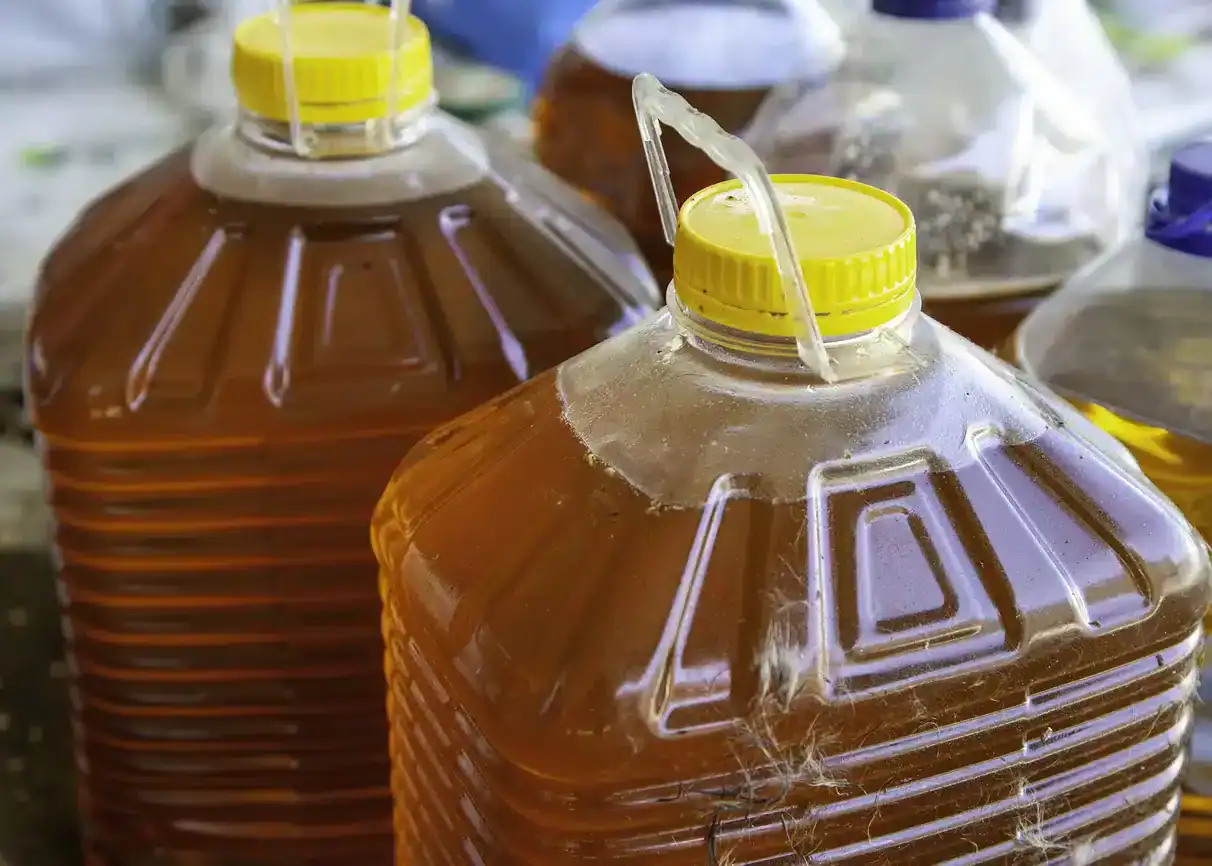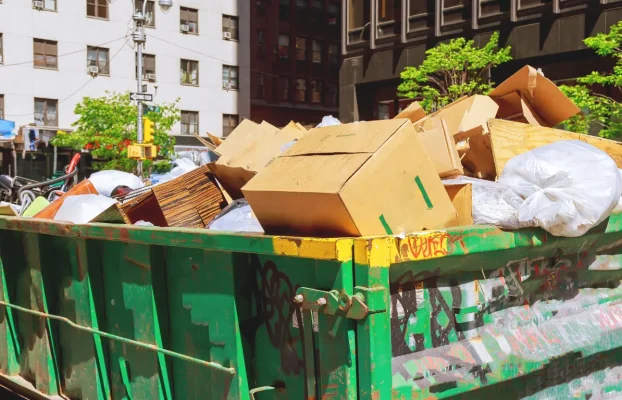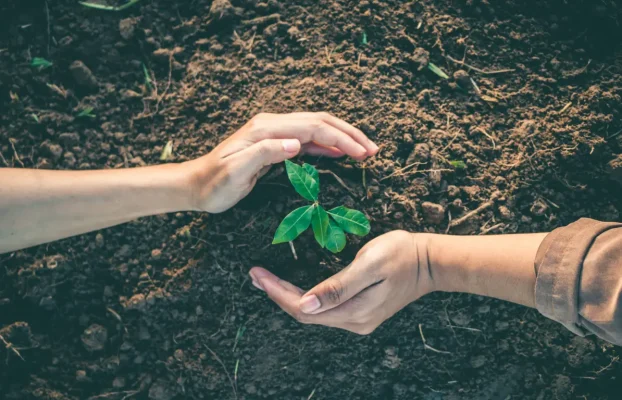Mastering the Art of Cooking Oil Disposal: A Comprehensive Guide
Did you know that American restaurants and hotels produce 3 billion gallons of waste cooking oil per year?
Although accurate data about used cooking oil produced by American households is hard to determine, the global used cooking oil market size reached $6.6 billion in 2023 and is expected to grow to $11.2 billion by 2032.
So, what does this mean for you?
That’s a lot of oil that many people don’t know how to handle.
But don’t worry. If you’ve ever finished frying something and found yourself wondering what to do with used cooking oil, you’re not alone. Many people aren’t sure how to dispose of it properly, and pouring it down the drain can cause serious plumbing issues.
Luckily, you’ve found this guide to help you understand how to dispose of cooking oil in the safest and most eco-friendly way possible. Let’s find out together!
Get a Live Quote Now
Connect to a live representative and get a quote in real time for junk removal in your area.Table of Contents
- TL;DR
- Jiffy Junk's Role in Cooking Oil Disposal
- The Hidden Life of Used Cooking Oil
- The Psychology of Oil Disposal Habits
- Innovative Disposal Solutions
- The Global Impact of Local Actions
- Practical Tips for Everyday Oil Disposal
- Navigating Local Disposal Regulations
- The Role of Businesses in Oil Disposal
- Future Trends in Oil Disposal and Recycling
- Jiffy Junk’s Commitment to Sustainable Practices
- Learnings Recap
- Final Thoughts
TL;DR
- Waste oil is a valuable source.
- Improper oil disposal methods significantly impact the environment.
- Laws and regulations aim to regulate oil disposal practices.
- New technologies can improve waste management and protect the environment.
Jiffy Junk's Role in Cooking Oil Disposal
Let’s ask an important question: how do you dispose of cooking oil?
Cooking oil is considered an organic material, and improper disposal can lead to environmental harm and plumbing issues. So, what is the best way to get rid of it?
Pouring it in your sink or toilet (yes, some people do that) isn’t the best solution.
In fact, it’s not just going to harm your pipes in the long run, but it’s also bad for the environment.
At Jiffy Junk, we’re committed to helping our clients dispose of all their garbage in the safest, most convenient, and most eco-friendly way possible. And this includes disposing of used cooking oil.
Disposal regulations for used cooking oil can vary by state. But in most cases, we can pick up your used cooking oil as long as it’s ready for proper disposal.
In New York State, service establishments that sell at least 500 gallons of new oil annually and perform vehicle servicing must accept up to 5 gallons of used oil per person per day at no charge.
This aligns with our policy at Jiffy Junk where we prioritize eco-friendly practices to keep your house clean and help the environment. Our company celebrated Climate Week in 2024 in NYC by planting more than 15,000 to-date, so we’ll make sure that your used oil is disposed of in a way that doesn’t pollute ecosystems.
In Washington State, you may dispose of fats, oils, and grease from food in your garbage cans. Used cooking oil can also be recycled into biodiesel after being picked up by our professionals.
If you have large amounts of oil, for example as a waste of deep-frying, our professionals will advise you to mix it with an absorbent material like cat litter to make it easier to pick up.
Wherever you are, you shouldn’t worry about getting rid of cooking oil because our network is constantly expanding to reach every location. And it only gets better. We’ve recently incorporated AI into our booking process to streamline it and make it more straightforward.
The Hidden Life of Used Cooking Oil
There’s a lot going on in the junk removal industry that you might not be aware of. Believe it or not, the oil you use to fry your potatoes or deep-fry a turkey negatively impacts the environment if you don’t dispose of it adequately.
Used cooking oil embarks on a fascinating journey once it leaves our kitchens, with its disposal methods significantly influencing environmental health. Proper management can transform this seemingly mundane waste into a valuable resource, which highlights the importance of responsible disposal practices.
When we heat cooking oils, especially at high temperatures like those used in deep frying, several chemical reactions occur. Exposure to oxygen leads to the formation of free radicals and other reactive compounds.
Also, water interacts with triglycerides in the oil, breaking them down into free fatty acids and glycerol. Heat causes oil molecules to combine, increasing viscosity and leading to the formation of undesirable substances.
These alterations not only degrade the oil's quality but also pose environmental risks if it’s disposed of improperly.
Discarding used cooking oil down the drain can lead to clogged pipes and sewer systems. Moreover, when such oil reaches natural water bodies, it can form a film on the water's surface, disrupting oxygen exchange and harming aquatic life.
So, what is the best way to get rid of and recycle cooking oil?
Before diving into disposal methods, consider reviewing our junk removal tips for general waste management strategies that can complement your cooking oil disposal efforts.
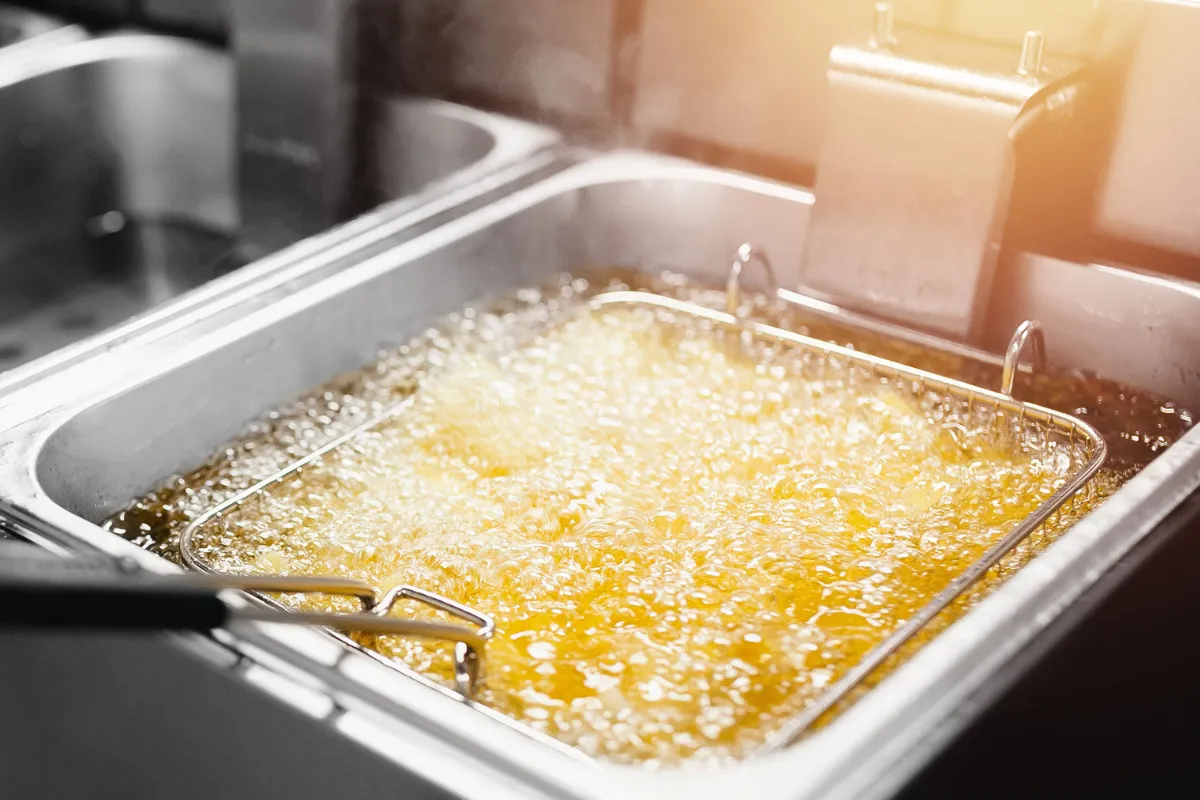
Heat changes the oil’s qualities and the improper disposal of used cooking oil imposes environmental risks.
Source: Flameuk.co.uk
From Culinary Waste to Valuable Resource
Did you know that an entrepreneur used cooking oil to establish a successful $2.5 million franchise recycling cooking oil?
Yes, you’re done using your cooking oil, but that doesn't mean it’s completely useless. As a matter of fact, it’s a potential goldmine of resources and with the right processes, it can be transformed into biodiesel, soap, animal feed, and other useful products.
At Jiffy Junk, our goal is to ensure no waste ends up in a landfill. This shift in perspective from waste to resource is crucial for sustainable waste management practices and perfectly aligns with our business policies. Although junk removal is never really free, the cost of disposing of used cooking properly is totally worth it.
The Biodiesel Revolution
Renewable energy in the future, and discarded cooking oil can be a game-changer as it can be used to produce biodiesel. Not only it reduces waste but it’s also a cleaner-burning fuel alternative.
Based in Prairie City, Iowa, Midwest Renewable Biofuels collects over 7 million pounds of used cooking oil annually from various establishments, including restaurants and schools.
Chevron Renewable Energy Group's biorefinery in Newton, Iowa then processes this collected oil into high-quality biodiesel. At the same time, the ASTM D6751 standard ensures biodiesel quality for engine performance and emissions.
But that’s not all. Glycerol is a byproduct of biodiesel production with several applications in pharmaceuticals and cosmetics.
Saponification: From Grease to Cleanse
Did you know that this used cooking oil in your kitchen can be used to make soap, in a process known as saponification? This chemical reaction transforms a potential pollutant into a useful cleaning product to further enforce the principles of sustainable living. Adding essential oils or herbs can enhance soap properties and add therapeutic benefits.
| Soap Type | Oil-To-Lye Ratio | Curing Time | Properties |
|---|---|---|---|
| Castile | 3:1 | 4 to 6 weeks | Mild and moisturizing |
| Laundry | 2:1 | 2 to 4 weeks | High cleansing power |
| Shampoo | 5:1 | 6 to 8 weeks | pH balanced for hair |
The Environmental Consequences of Improper Disposal
How many people have you seen pouring their used cooking oil down the drain? Or worse, in the garden?
We don’t judge at Jiffy Junk but we educate our clients, teaching them that this is the worst they can do to their communities.
While it might seem like an easy out, improper disposal contributes to environmental damage and costly infrastructure repairs as it clogs drains, damages pipes, and pollutes water.
When oil enters rivers and lakes, it reduces oxygen transfer, making it harder for aquatic life to breathe. It also accumulates in food chains, with oil compounds affecting fish and other organisms.
This is why we take it personally to teach our clients how to dispose of grease like old cooking oil properly.
But did you know that a 2024 survey found that only 60% of food service businesses and institutions within a regional district were using proper cooking oil collection services for disposal? That means 40% of used oil is wasted and not recycled.
At Jiffy Junk, we cooperate with local communities, businesses, and households to help increase the amount of recycled oil. Our bulk removal services offer a responsible household waste management program by collecting different items, including used cooking oil.
Aquatic Ecosystem Disruption
Just because you can’t see the oil used doesn't mean it won’t affect you. Oil runoff severely impacts aquatic ecosystems and it affects water-dwelling organisms at various levels of the food chain. Not only does it disrupt the delicate balance of these environments, but it also finds its way back to your food.
Bioaccumulation of oil compounds in aquatic organisms affects entire food webs and microbial communities shift in response to oil pollution, which alters ecosystems.
Proper junk removal benefits the environment in many ways, and one of them is recycling old oil. At Jiffy Junk, we focus on green practices to keep different communities clean. We also offer amazing financing options to encourage more people to use our environmentally friendly services.
The Fatberg Phenomenon
A few problems can be as threatening as fatbergs to urban communities. In fact, a single fatberg was discovered in London in 2017 and it required nine weeks of hard work to remove 130 tonnes of hard waste.
So what are fatbergs?
This is the solid waste that grows like a snowball, fed by different pollutants including non-biodegradable items like wipes, grease, and cooking oil. Because of chemical reactions in sewers, calcium reacts with fats to produce soap-like compounds that become more challenging to remove.
As a household owner, there are several things you can do to make sure you aren’t adding to the problem. First, you shouldn’t dump your used oil in the toilet, drain, or garden. This video explains an easy way to turn cooking oil into a solid, which is easier to dispose of.
Now, it could be time to order our seasonal dumpster rental services, choosing the right size to fit all your junk. We’ll help you dispose of waste, including used cooking oil, making sure that it doesn’t end up in a lake or a landfill.
If you live in a big complex, we can make things easier with our valet trash service. Put all your trash, including the frozen oil containers, in tied plastic bags and we’ll take care of the rest.
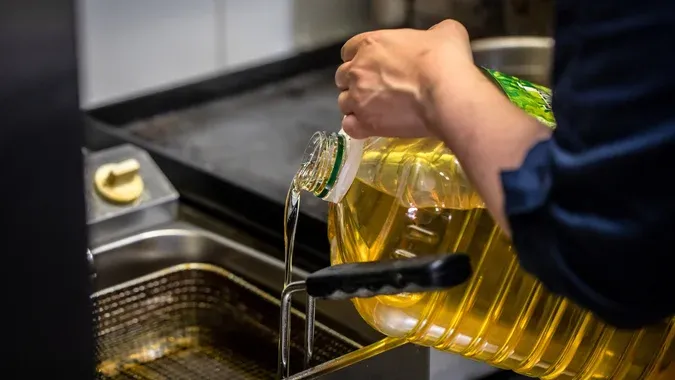
Cooking oil disposal is a major concern due to its environmental and economic impact.
Source: Entrepreneur.com
The Psychology of Oil Disposal Habits
After deep-frying chicken, most people don’t put much thought into how they dispose of used cooking oil. However, their choices are often shaped by subconscious behaviors and habits. Many don’t know a proper way to dispose of cooking oil, and they just follow others without thinking much about the consequences.
Understanding these psychological factors is key to promoting responsible disposal methods. Cognitive biases, social norms, and incentive-based programs all play a role in shaping disposal decisions.
Overcoming Convenience Bias
People sometimes choose quick yet harmful disposal methods due to convenience bias. We at Jiffy Junk know this best, so we offer special services to help people dispose of their junk responsibility, like our appliance removal services.
When it comes to disposing of cooking oil, we understand this mental hurdle and offer help to promote proper oil disposal.
Habit formation psychology is crucial to our business as it helps people stick to new and sustainable disposal routines. This is why we believe that it’s important to help our clients understand how junk removal services work.
At Jiffy Junk, we work with communities to promote green disposal practices. This includes educating people about things that can be recycled, like cooking oil, instead of dumping them into the nearest landfill.
The Power of Social Norms
At Jiffy Junk we understand that the improper disposal of junk isn’t an individual problem.
This is why we collaborate with communities to educate and offer multiple services with reasonable prices to establish an effective strategy for promoting proper disposal practices on a larger scale. You can check our reviews to see what clients say about our different waste removal services.
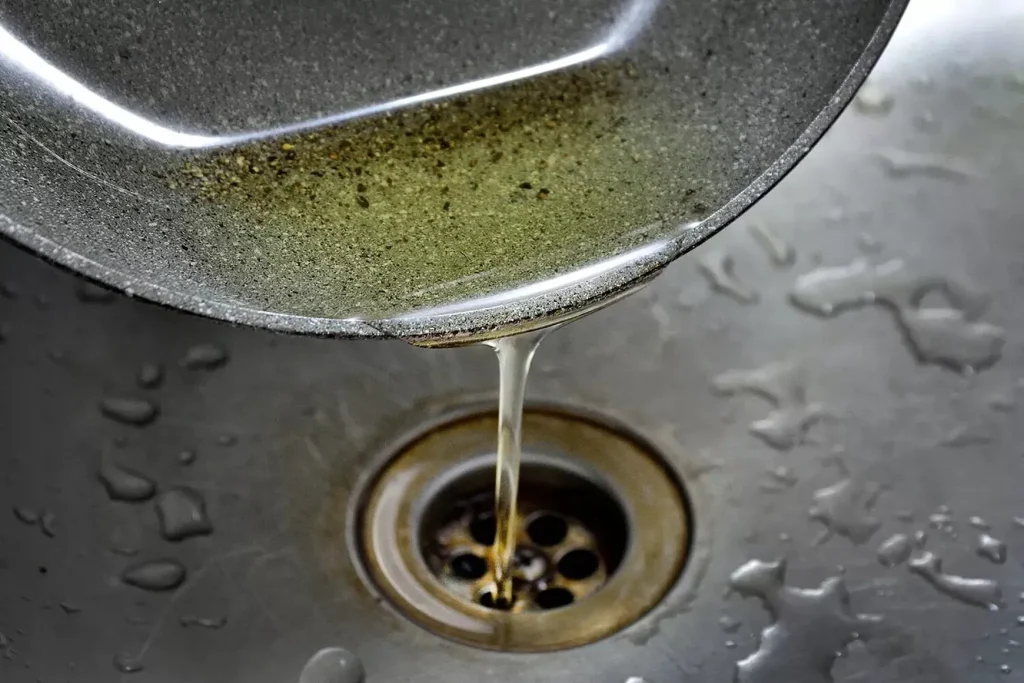
Disposing of used cooking oil down the drain can lead to various environmental issues.
Website: Thefirstmile.co.uk
Education and Awareness Campaigns
Let’s run a quick experiment. Ask your neighbors, friends, and family: how do you properly dispose of cooking oil?
The answers might shock you!
Education and awareness campaigns are essential to educate people about the importance of eco-friendly disposal methods. When our professionals arrive for pallet pickup and recycling services, they can provide guidance on the best ways to dispose of different items responsibly. This includes how to best recycle used oil.
Raleigh launches an annual cooking oil and grease collection program in an initiative, running from November 1, 2024, through January 10, 2025. It offers free curbside collection of cooking oil and grease, demonstrating how local governments can facilitate proper disposal and raise awareness.
To learn more about organizing your home for better waste management, including oil disposal, check out our comprehensive decluttering guide.
Innovative Disposal Solutions
So, how are cooking oil disposal methods evolving?
Technological advancements are revolutionizing cooking oil waste management to make disposal more efficient, convenient, and sustainable. Exploring these solutions can inspire new approaches to oil management in various settings.
For example, modern filtration technologies extend oil life and reduce waste generation, while some closed-loop systems in commercial kitchens automate oil recycling processes.
Since used cooking oil is worth a lot, collecting and responsibly disposing of it is part of our comprehensive cleanout services. These specialized services clear everything in a property to leave it squeaky clean, including used cooking oil that has been sitting around for a while.
Smart Oil Collection Systems
New technologies like IoT-enabled collection points are optimizing the oil recycling process. They make disposal more convenient for users while improving collection and processing efficiency.
While these new advancements are under development, at Jiffy Junk, we collaborate with the largest recycling facilities to ensure that your waste is handled properly and doesn’t negatively impact the environment.
Here are some new technologies that are currently reshaping the waste management industry.
| Technology | Function | Benefits |
|---|---|---|
| IoT sensors | Real-time monitoring | Optimized collection schedules |
| Machine learning | Predictive analysis | Improved resource allocation |
| Blockchain | Traceability | Enhanced transparency and trust |
| QR code tracking | Traceability | Increases engagement |
Community-Based Recycling Programs
At Jiffy Junk, we work with communities to improve waste management practices. We understand that a collective effort can be highly effective as these programs create a sense of community pride and shared responsibility.
We’re expanding our network with local contractors to reach every neighborhood. Additionally, you can collaborate with your neighbors to rent a 40-yard dumpster seasonally, and dispose of all your junk and clutter in a cost-efficient way.
Oil-to-Energy Cooperatives
Biodiesel production initiatives demonstrate the potential for transforming waste into a valuable resource at the community level. This can be used to fuel vehicles and machines.
As part of our mission at Jiffy Junk, we collaborate with different institutions to ensure that used cooking oil is used for energy generation.
The Global Impact of Local Actions
Every decision you make regarding how you dispose of waste and junk contributes to larger environmental and economic trends. Understanding this connection can motivate more responsible practices and highlight the importance of local actions in addressing global challenges.
The Ripple Effect of Proper Disposal
Do you know that something as simple as hiring our hoarding cleanout staff can have a global effect?
Yes, that’s right. Responsible oil management has far-reaching positive consequences. From reduced carbon emissions to job creation in green industries, proper disposal practices contribute to broader benefits that affect the whole economy.
Life cycle assessment (LCA) methods quantify the environmental impacts of different disposal options. Instead of dumping oil into your backyard, you can hire our yard waste removal services to guarantee that nothing, including used cooking oil, will impact the environment.
For more insights on sustainable waste management practices, including oil disposal, explore our article on bulk junk removal.
International Cooperation and Standards
Disposal of used cooking oil is a global concern. This is why several countries are aiming to standardize cooking oil disposal practices and share innovative solutions.
International cooperation in this area can accelerate the adoption of best practices and technologies worldwide.
Cross-Border Oil Recycling Initiatives
As more countries are aware of its potential, the demand for used cooking oil is increasing. Collaborations between different countries and manufacturers can lead to more efficient and effective recycling practices globally.
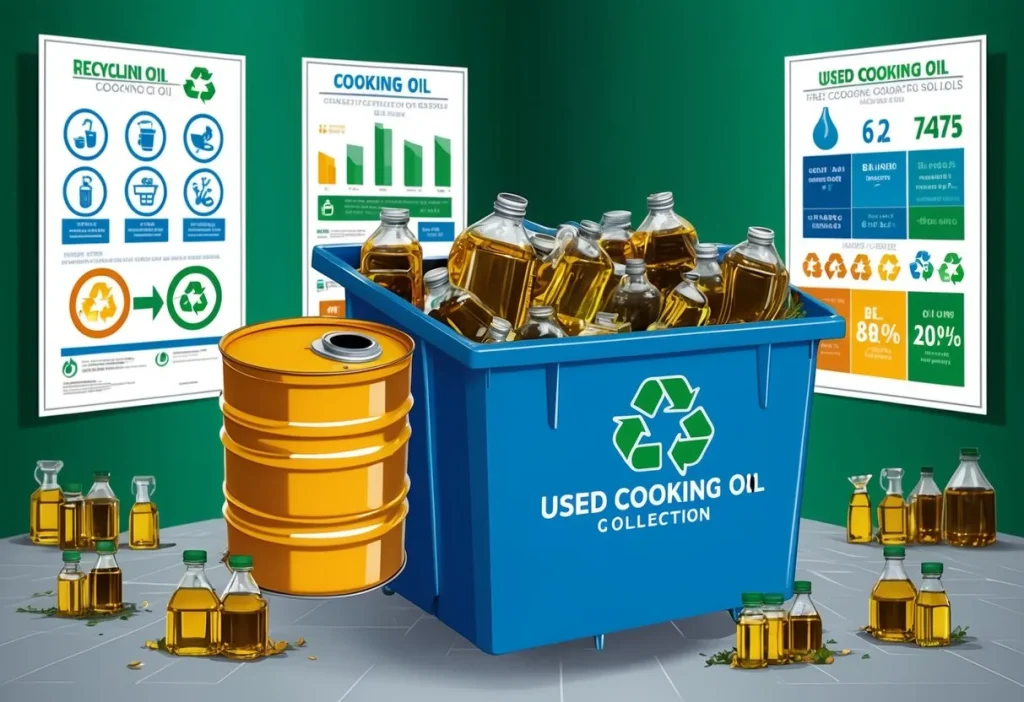
At Jiffy Junk, we collaborate with local communities to educate people about proper ways to dispose of cooking oil.
Source: Liquidrecover.com
Practical Tips for Everyday Oil Disposal
So, what is the best way to dispose of old cooking oil? Implementing proper oil disposal practices in daily life doesn't have to be complicated.
Whether you’re requesting a foreclosure cleanout service or our regular decluttering services, our professionals can educate you about the best ways to manage your cooking oil waste responsibly.
Cooling and Storing Used Oil
Right after cooking, proper oil removal begins. First, you need to cool the oil completely. Remember that the thermal properties of different oils affect cooling rates and storage requirements.
Choosing the Right Container
Selecting an appropriate container for used oil storage is crucial. The right choice prevents leaks, makes transportation easier, and ensures the oil remains in good condition for recycling.
It’s important to ensure that oil won’t affect the material. Moreover, the design should be suitable for oil collection containers.
For more tips on organizing your kitchen for efficient waste management, including oil disposal, check out our decluttering guide.
Filtering for Reuse
Some types of oil can be filtered to extend their usability and reduce waste. The filtration methods depend on particle size distribution in used oil.
DIY filtration methods such as cold filtration or gravity filtration using household materials like coffee filters or cheesecloth can help you use your cooking oil one more time. However, if you notice any off smell, then it’s best to use a fresh batch of oil.
Navigating Local Disposal Regulations
How do local disposal regulations differ from place to place? Regulatory frameworks govern household hazardous waste management in different communities.
Our franchising program at Jiffy Junk allows us to cooperate with local contractors, who are aware of the regulations and laws that impact how junk is dealt with.
Finding Local Collection Points
So, where can you dump your used oil?
Many communities offer designated collection points for used cooking oil. Locating these can make proper disposal much more convenient.
Unable to reach a local collection point? No problem! We offer full junk removal services to handle every type of household and commercial junk to keep the environment clean.
Even if you’ve been saving cooking oil for a while, our staff offers in-depth basement cleanout services to leave your space squeaky clean.
Understanding Recycling Schedules
Recycling programs often operate on specific schedules. Knowing these can help you plan your oil disposal more effectively.
But our booking process has never been easier. If you’re unsure about how much it will take to dispose of your used cooking oil, click on the bottom left corner and you’ll immediately get connected to one of our representatives for a free video call. We’ll provide an estimated price for our service and discuss the pickup details for maximum convenience.
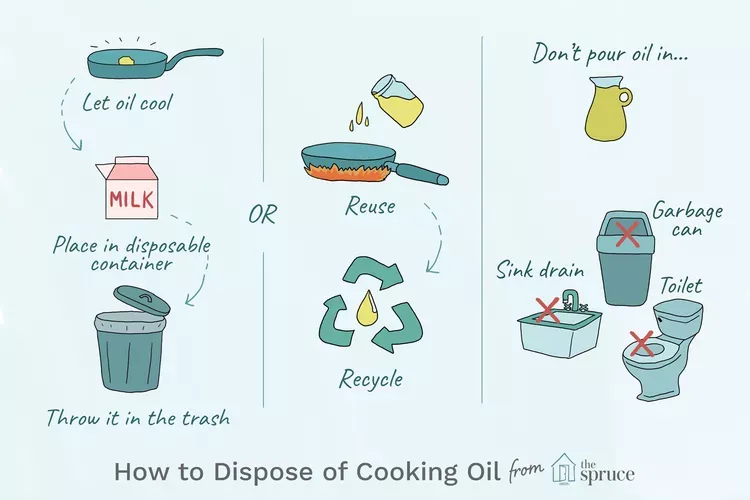
Recycling used cooking oil creates many job opportunities.
Source: The Spruce Eats
The Role of Businesses in Oil Disposal
Hospitality businesses like restaurants, hotels, and other food service establishments generate significant amounts of used oil. Their disposal practices can have a major impact on community-wide oil management.
This is why commercial oil disposal involves specific health and safety regulations for commercial kitchen oil handling.
Commercial Oil Recycling Services
Businesses that generate large amounts of used cooking oil should prioritize the safe disposal of used cooking oil. Many of them partner with specialized services for oil collection and recycling to guarantee that it won’t impact the environment negatively.
At Jiffy Junk, we offer a variety of commercial junk removal services to remove different types of waste. Enter your Zip code and book our service now for greener business practices.
Incentives for Proper Disposal
Businesses can receive tax credits and special loan programs for the responsible disposal of used oil. Such programs encourage businesses to design better practices for recycling oil.
Our storage unit cleaning services can help your business stay aligned with green junk removal practices by getting rid of all your waste, including stored oil.
Future Trends in Oil Disposal and Recycling
Emerging technologies and changing regulations are shaping the future of how we manage cooking oil disposal.
Emerging Technologies in Oil Recycling
New innovative technologies like nanotechnology applications can affect oil purification and conversion. We can also expect artificial intelligence to optimize oil collection and recycling processes.
The Promise of Closed-Loop Systems
Sustainable oil management is changing with closed-loop systems. In these systems, oil is continuously recycled and reused.
Jiffy Junk’s Commitment to Sustainable Practices
At Jiffy Junk, we’re always looking for ways to expand our eco-friendly services. Our household junk removal services include disposing of different kinds of waste, including used cooking oil and other types of grease.
We’re always concerned with preserving the environment by planting trees and implementing green waste removal practices. So, if you’re struggling with oil disposal or any other waste management challenges, don't hesitate to reach out.
Our staff is only one click away. Press the bell at the bottom left corner and you’ll immediately get connected to our representative. You can also fill out a form if you have a special request and we’ll get back to you as soon as possible.
Learnings Recap
We’ve reached the end of our comprehensive cooking oil disposal guide. If you’ve previously had any second thoughts about how to get rid of oil waste, you know now how it can impact your community and the environment.
Proper cooking oil disposal is crucial for environmental protection and resource conservation. Luckily, used cooking oil can be transformed into valuable products like biodiesel and soap.
Several community-based initiatives and innovative technologies can improve oil disposal practices. At Jiffy Junk, we collaborate with local communities to make oil disposal more accessible.
Every individual action in oil disposal has a significant global environmental and economic impact. This is why we encourage you to contact us today by clicking the bell at the bottom-left corner, and we’ll schedule a waste removal pickup appointment with a clear quote to guarantee that your used oil is ethically disposed of.
There’s a lot going on in the used cooking oil industry, with integrated waste management systems designed to optimize cooking oil collection, recycling, and disposal. This is why at Jiffy Junk we believe that education and awareness are essential for changing oil disposal habits and promoting sustainable practices.
Final Thoughts
Forget the days when you used to dump used oil into the drain or in your garden. Proper cooking oil disposal is more than a household chore—it's a crucial step towards environmental protection and resource conservation.
By understanding the impacts of our disposal choices and adopting responsible practices, we can all contribute to a more sustainable future. Remember, every drop counts in the grand scheme of environmental stewardship.
This is what we’re all about at Jiffy Junk. We offer comprehensive decluttering services to get rid of all your junk. At the same time, we follow green practices to ensure that your waste won’t end up in a landfill as we teach you how to dispose of cooking oil properly.
Even tough jobs like foreclosure cleanout and hoarding cleanout services won’t be an issue because we know how to handle every type of waste. We’re only one click away, so click the bell at the bottom-left corner of our ontact page and we’ll make your place shine!
More from Jiffy Junk
Robust Service
Interested in Getting Started?
Have a big cleanout job that needs to be done right away? Contact us today. We'll get rid of your junk in a jiffy!
Fast & Reliable
What Our Customers Are Saying
Thousands of satisfied customers across America have shared their Jiffy Junk Experience.
